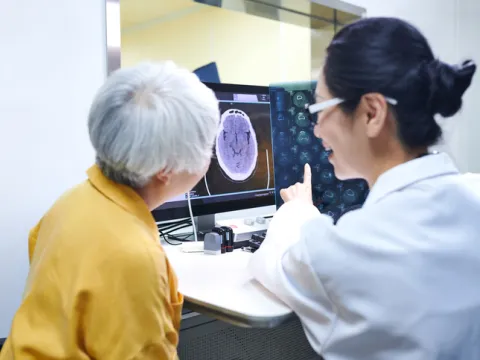- AdventHealth
Recent results from the NSABP B-51-RTOG 1304 clinical trial showed that the addition of regional nodal irradiation (RNI) does not improve outcomes in breast cancer patients who present with biopsy-proven positive axillary lymph nodes and whose nodes convert to pathologically negative after neoadjuvant chemotherapy. The findings were published on June 5, 2025, in the New England Journal of Medicine. Eleftherios (Terry) Mamounas, MD, medical director of the breast program and research activities at AdventHealth Cancer Institute, was the lead author.
Use of Regional Nodal Irradiation in Breast Cancer
RNI targets lymph nodes in the armpit (axillary), near the collarbone (supraclavicular) and under the breastbone (internal mammary). Used after breast surgery, including lumpectomy or mastectomy, it is generally a standard part of treatment for breast cancer in patients with pathologically positive axillary nodes and aims to reduce the risk of cancer recurrence by killing any remaining cancer cells in those nodes.
However, with the increasing use and efficacy of neo-adjuvant chemotherapy, clinicians often encounter patients who initially present with axillary lymph node involvement (clinically node-positive status) but whose axillary lymph nodes convert to pathologically tumor free (ypN0) after neoadjuvant chemotherapy.
“The benefit of RNI in this population of patients was unclear,” shares Dr. Mamounas. “No prospective outcome data exist showing benefit, and this had led to clinical uncertainty and variability in practice. Our clinical trial aimed to bridge this knowledge gap.”
About the NSABP B-51–RTOG 1304 Study
Activated in August 2013 and closed to enrollment in December 2020, the NSABP B-51–RTOG 1304 study was a prospective, phase III, multicenter randomized clinical trial. It enrolled 1,641 patients stratified by type of surgery (mastectomy, lumpectomy), hormone receptor status (ER-positive and/or PgR-positive; ER- and PgR-negative), HER2 (human epidermal growth factor receptor 2) status, adjuvant chemotherapy, and pCR (pathologic complete response) in the breast. Study participants were then randomized to the RNI arm vs. no RNI. Anti-HER2 therapy was required for HER2+ patients as was endocrine therapy for hormone-receptor positive patients.
The primary endpoint was invasive breast cancer recurrence-free interval (IBCRFI). Final analysis was planned after 172 events or 10 years post-study initiation. At the time of analysis, 109 IBCRFI events (63% of the planned 172) were confirmed. This trial was designed, conducted, and overseen by NRG Oncology, a member of the National Clinical Trials Network, and sponsored by the National Cancer Institute (NCI).
Key Findings
The researchers found that RNI did not significantly improve IBCRFI (HR=0.88, 95%CI 0.60-1.28; p=0.51, five-year point estimates: no RNI:91.8%, RNI:92.7%) or improve any secondary endpoints of loco-regional recurrence-free interval, distant recurrence-free interval, disease-free survival, or overall survival.
“The results of our trial indicate that patients with positive axillary lymph nodes who become pathologically tumor free after neoadjuvant chemotherapy have low rates of disease recurrence and do not receive a statistically significant or clinically meaningful benefit from regional nodal irradiation at 5 years,” concludes Dr. Mamounas. “These results support a shift in treatment strategy. We will continue follow-up for evaluation of longer-term outcomes for these patients.”
Recent News
Using a muscle lab-on-chip model aboard the International Space Station (ISS), AdventHealth Translational Research Institute’s Dr. Paul Coen has been working with a multidisciplinary team from the...
While most clinical trials for Alzheimer’s disease have focused on patients with early or mild cognitive impairment, roughly 30% of those with Alzheimer’s have moderate stage disease for which there...
Under the leadership of Scientific Director and Principal Investigator Bret H. Goodpaster, PhD, the AdventHealth Translational Research Institute (TRI) is now enrolling men and women 70 years of age...
AdventHealth Research Institute is the first in Central Florida to participate in the expansion phase of a clinical trial exploring a potential new oral immunotherapy treatment for mild to moderate...
Under a single compassionate use Investigational New Drug (IND) authorization cleared by the U.S. Food and Drug Administration (FDA), the AdventHealth Neuroscience Institute worked with NKGen Biotech...
Under the leadership of Dr. Valeria Baldivieso and Dr. Chandan Reddy, the AdventHealth Research Institute is the first and only site in Orlando offering the Exablate Blood-Brain Barrier (BBB)...
Approximately 1 billion people throughout the world suffer from tinnitus (ringing in the ears), and it is the number one disability of those who serve in the U.S. military. The condition can disrupt...
Metabolic dysfunction associated steatotic liver disease (MASLD), formerly referred to as nonalcoholic fatty liver disease (NAFLD), affects about 70% of people with type 2 diabetes, placing them at...
AdventHealth East Orlando recently became the first hospital in Florida to earn Advanced Foot & Ankle Surgery Certification from DNV, a worldwide, independent certification body.
With an aging population and increases in the prevalence of neurological conditions like Alzheimer’s disease and dementia, physicians and patients alike continue to seek new tools and approaches to...
In a new article published in the medical journal Age and Ageing, AdventHealth Research Institute’s Dr. Audrey Collins shares the results of a recent study evaluating the impact of exercise on...
The AdventHealth Neuroscience Institute is the first in Florida and one of the first in the country to begin recruiting patients with primary progressive or non-active secondary progressive multiple...












